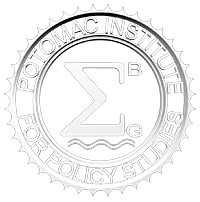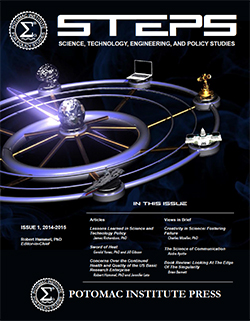Editor's Notes
- Details
- Published: Wednesday, 06 March 2024 12:23
- Written by Robert Hummel PhD
- Hits: 11796

Robert Hummel, PhD
With this issue of STEPS, which stands for Science, Technology, Engineering, and Policy Studies, we present five thoughtful pieces related to US policy considerations that are impacted by advanced science and technology.
Patrick Ennis presents “Peak China,” which is his serious proposition that China is entering a long period wherein its capabilities and technology developments will be in descendancy, in contrast to China’s history of the past couple decades of phenomenal economic and technological growth. This concept of China’s challenges is now repeated often in current geopolitical discussions, but Ennis’ theory was presented in a Potomac Institute course on China in March 2023, and the article was made available on the Potomac Institute website in September 2023. Unlike other analyses that are based on economic and demographic data, Ennis’ analysis is based on numerous experiences as a businessperson in China and elsewhere in Asia over the past few decades. His anecdotes buttress facts and figures in a way that can account for human connections and aspirations, and portend a Chinese population that will be increasingly dissatisfied with their lives and prospects. Lest we take heart in their descendancy, Ennis points out that this makes China yet more dangerous at this point in time. There are serious implications for the US in the ongoing trade and technology war with China.
An article by Lois Hollan, for which I am a co-author, is inspired by discussions with Lee Buchanan concerning the use of social media and related digital information sources to provide indications and warnings about intelligence matters. The key idea in those discussions was that the AI breakthrough represented by large language models (LLMs) should provide a mechanism to discriminate between normal situations and unusual circumstances that requires further analysis by intelligence officials. The article advocates for a development project that would leverage LLM technologies in a government and industry program to provide early warning in military and other national security threats.
John Wilson was a major contributor to a Potomac Institute project that produced a report on the national security innovation base, in answer to congressional queries to the Department of Defense on means to support the continued ability of the nation to foster “innovation” in national security spheres. Wilson was particularly concerned with the way in which the innovation ecosystem that has developed (over many decades) in the commercial marketplace to produce start-ups and unicorns and massive business growth—how this ecosystem can be translated to benefit national security interests. Wilson’s article provides some important lessons from the commercial sphere, and some recommendations to the expanding set of initiatives that intend to bring greater innovation to defense systems development and acquisition.
Long before the CHIPS Act and other realizations of the importance of microelectronics to the economy and security of the US, the Potomac Institute was concerned with the strategies for ensuring access to secure microelectronic components for national security. Much of this work was in conjunction with Ted Glum, who was at the time the Director of the US Defense Microelectronics Activity. Now as a member of the Board of Directors, Glum provides a reminder that the CHIPS Act alone does not provide assurance of supplies of secure parts. The misnamed “Trusted Foundry Program” has a long history that Glum outlines. He points out how the program addresses security issues at all points in the production train. As teams across the departments and agencies of the US federal government attempt to ensure that national needs for secure parts can be met, Glum’s article is an important reminder that there are established ways to address security issues according to the needs presented by applications. Glum provides recommendations as to how the program should be enhanced as the nation increasingly “on-shores” factories and facilities that can ensure domestic supplies.
The Potomac Institute hosts interns from US universities, who conduct mini studies during their term in consultation with Institute personnel. Rindha Sudhini, an undergraduate at the University of Pennsylvania, was an intern in the fall of 2023, and her excellent report gave rise to an article by Sudhini in this issue of STEPS, concerning ways in which digital record-keeping and information technologies, to include artificial intelligence, can enhance government transparency. At issue is which agencies and elements of the government have the expertise to effect the changes needed that modernize the outmoded and ineffective “freedom of information act” (FOIA) mechanisms. Sudhini makes cogent recommendations.
While enjoying these articles in this issue of STEPS, consider contributing an article for subsequent issues. The next issue should focus on challenges and possible solution directions for the next administration, given that the election of 2024 will usher in a new Congress and turnovers at various departments and agencies.
Robert (Bob) Hummel, PhD
Editor-in-Chief, STEPS
Chief Scientist, Potomac Institute
This email address is being protected from spambots. You need JavaScript enabled to view it.



